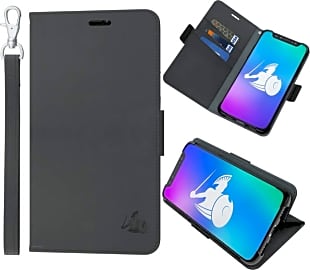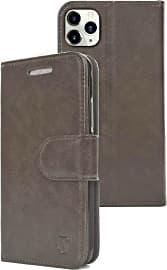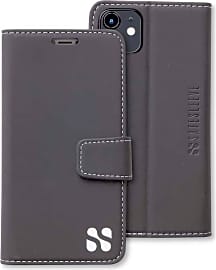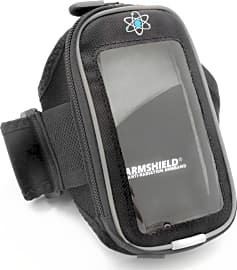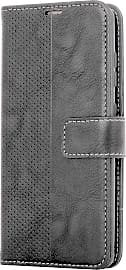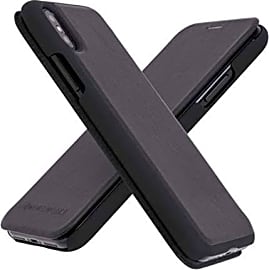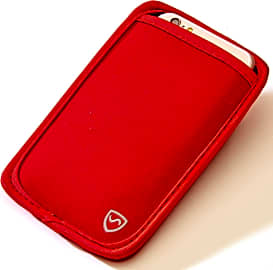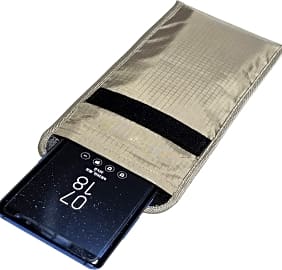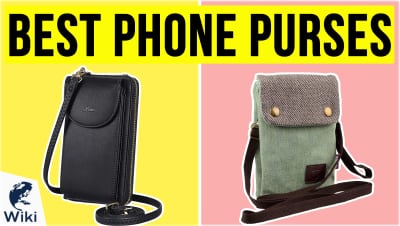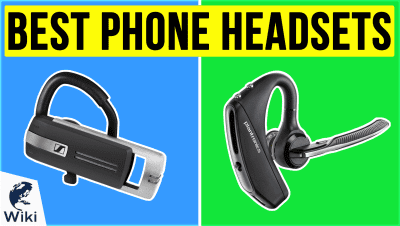The 10 Best Anti-Radiation Phone Cases

This wiki has been updated 30 times since it was first published in October of 2017. While there is currently no proof that cell phones produce enough emissions of any kind to be harmful, those who prefer to be overly cautious and don't want to take any chances with their health can use one of these anti-radiation cases. Most look just as stylish as traditional models, and some even double as anti-spying and RFID blockers to keep your credit cards, location, and data safe, too. When users buy our independently chosen editorial picks, we may earn commissions to help fund the Wiki.
Editor's Notes
November 06, 2020:
Before purchasing an anti-radiation phone case, it is important to understand the effectiveness and risks associated with the product. It is difficult to find an electromagnetic field expert who firmly recommends the use of an anti-radiation case. However, those who will at least discuss it often bring up the point that, if such items were to effectively diminish radiation, they would then also interfere with a phone's signal. The more a case blocks radiation waves, the more it would block your signal, so you should be prepared for some level of interference with how your device functions.
You can, however, find a case that only offers EMF wave blocking on the side that faces your body, which would still allow for some signal. In fact, some experts say this might be the smartest solution because, when you achieve total radiation blocking, your phone may emit a stronger signal, attempting to connect to nearby towers, and that could boost radiation. With that in mind, your best solution may be to compromise with a case that offers some level of radiation blocking, without totally cutting off your signal, however you will have to decide which type of option you feel the most comfortable with.
When making our selections for this list, we looked for cases that protect the user from radiation, but also the device from damage. We aimed to include a variety of styles and to prioritize durable materials. Offering models that suit a range of current popular smartphones was also important.
We immediately removed the Visoul Folio because, upon further inspection, we found that it doesn't have any features meant to block radiation. We also eliminated the Blocsock Pouch because it doesn't have very robust construction. As an alternative lightweight, sleek option, we liked the SYB Pouch, which attaches to a belt loop for secure carrying, and the Onever Signal Blocking Bag, which is a simple and lightweight pouch that protects against EMF waves, as well as RFID readers.
If you are particularly concerned about damage to your phone in the event of falls, you may like the RadiArmor Shield, which has cushioned bumpers and is lined with shock-absorbing rubber. Meanwhile, the Gadget Guard Rugged has been tested to sustain 10-foot drops.
The Armour Shell was another item we decided to remove because it struggles to shut all of the way, which makes it almost useless at combating radiation. However, if you do want something rather stylish to take its place, there is the Waves Protect Premium Flip, which is made with real Italian leather, or the RadiArmor Shield, which is made with vegan leather. Both choices also contain slots for credit cards or IDs, which is convenient when you don't feel like carrying a wallet.
July 10, 2019:
The biggest question to ask yourself during the buying process is just how concerned you are about the possibility of radiation. If you basically have a "better safe than sorry" approach, then you'll likely prefer an option like the Visoul Folio, which doesn't interfere with regular use of the phone — but may let more radiation through than some other options. If you're convinced that your phone is killing you, however, go with something like the Co-Link Anti-Spying, which allows you to completely insulate yourself from harm (but at the expense of not using your phone at the same time).
Of course, using the phone isn't the only issue — there's also the matter of carrying it around. Many of the slim cases on here add little heft to the phone, so you can still keep it in your pocket without feeling like you're lugging around a bowling ball. The pouch-like options, on the other hand, are probably best kept in a bag or purse rather than on your person.
Several of the models above also have RFID blockers to protect your personal information, making them sensible places to keep your credit and debit cards. Using them for that purpose will likely mean streamlining the number of cards you carry, though, as most of the cases can only accommodate three or so, plus a little cash.
Special Honors
GoDark Faraday Bag The GoDark Faraday Bag has a durable polyester exterior that's water- and puncture-resistant, and a felt liner that guards against scratches and is designed to never accidentally activate your touch screen. Weighing less than three ounces, it adds almost no bulk to your device. Plus, it has a roll-top design to increase its signal-blocking capabilities. godarkbags.com
Smart & Safe EMF Radiation Blocking Belt Pouch The Smart & Safe EMF Radiation Blocking Belt Pouch is available in four sizes, so finding one to fit your device should be easy. It has durable leather construction and a strong magnetic closure, and, as its name promises, it conveniently attaches to the accessory you use to hold up your pants. smart-safe.com
Should You Be Worried About Cell Phone Radiation?
That being said, if you're really concerned about cell phone safety, maybe put it down while you're driving?
While they're certainly convenient and ubiquitous, it can sometimes seem like cell phones are trying to kill us. Whether by luring us into texting while driving, having their batteries explode, or encouraging you to take a dangerous selfie, there are myriad ways in which you can die while using your phone.
And now we have to worry about radiation, too?
As it turns out, some people have long been worried that the radiofrequency radiation emitted by cell phones could lead to tumor growth over time. Those concerns have largely been waved off by both manufacturers and many scientists.
However, there have been some studies that have shown that rats can develop a specific type of brain tumor, called a schwannoma, if they're subjected to prolonged radiofrequency radiation. These studies examined thousands of rats and mice, and exposed them to a variety of radiations — everything from "near-field" (which is what you get holding a phone to your ear) to "far-field" (which is what you get walking through everyone's Wi-Fi signals at Starbucks).
The results are chilling — but they may also be meaningless.
For one thing, "radiation" is a notable scare word. When people hear it, they think Hiroshima and Chernobyl; however, there are different types of radiation, and many of them are harmless.
Also, humans aren't rats. The radiation the rats were exposed to was enough to cover their whole bodies — so our dosages would be a lot lower, relatively speaking. Also, given how prevalent cell phone use is, shouldn't we be seeing a lot more cases of schwannoma in people?
Of course, the fact that there's relatively little evidence to support the idea that cell phones cause cancer isn't definitive proof that they're safe. However, right now there's little reason to fear that talking to Grandma on the phone will cause brain tumors — but we can't fault you for wanting to play it safe, either.
That being said, if you're really concerned about cell phone safety, maybe put it down while you're driving?
Do Anti-Radiation Cases Work?
If you're concerned that talking on your cell phone could cook your brain, you may want to invest in an anti-radiation phone case. The basic idea behind these cases is that they redirect the radiation produced by the phone away from the user, so it isn't constantly bombarding your skull. They can accomplish this in a variety of ways; one involves using antennas to redirect the waves, and another uses silicone or other materials to block the waves.
It turns out that some independent studies have shown that some cases do, in fact, redirect some or most of the radiofrequency radiation away from the user. That's not quite enough to definitively say they work, however.
They can accomplish this in a variety of ways; one involves using antennas to redirect the waves, and another uses silicone or other materials to block the waves.
First off, not all of them are useful — and the bad ones could actually increase the amount of radiation you subject yourself to. This is especially true if they have a flip case that you leave open; by placing your phone between your ear and two layers of casing, you're actually encouraging the radiation to double back towards your skull.
In fact, many are designed for you to talk with the cover closed, which is not how many people use their phones. If you use them correctly, though, they're actually pretty effective — but are you willing to sacrifice some comfort and call quality?
That's an especially important question when you realize that just because they "work" doesn't mean that they're beneficial. After all, their effectiveness claims rest on their ability to block a fraction of electromagnetic radiation that may not be harmful in the first place.
Also, unless you constantly have your phone to your ear, there's a good chance you're exposed to more radiation while walking through a crowded city street than talking on your smartphone. You're still being bombarded by everyone else's phone radiation, not to mention Wi-Fi signals.
All this is to say that, if you're truly worried about this problem, then yes, you should consider an anti-radiation case. Just realize that you're much more likely to die from walking into traffic while texting than getting a brain tumor from your iPhone.
Other Tips For Improving Cell Phone Safety
Beyond investing in an anti-radiation case, there are some simple changes you can make to your cell phone habits that can limit the amount of radiation you expose yourself to.
The most obvious is to simply limit the amount of time you spend glued to it. Try to text instead of calling, and keep your phone in your purse or backpack when not in use.
If you spend a lot of time watching movies on your device, make sure to download them first, preferably while your phone's in another room.
When you do have to talk on it, try not to keep it plastered to your ear the entire time. Leave an inch or so between your head and the phone, or better yet, use a headset or speakerphone.
If you spend a lot of time watching movies on your device, make sure to download them first, preferably while your phone's in another room. Then, when you're ready to watch one, put your phone in airplane mode to block as many signals as possible.
Try to limit your phone use to places where you have plenty of bars. The weaker your signal, the harder the phone works to connect — which means more radiation. Likewise, try not to use it in elevators, trains, or anyplace else where the signal has to power through lots of metal.
With a little bit of finagling, you can minimize the amount of radiation you expose yourself to on a daily basis. This can lower your risk of tumors — but know that it also lowers your risk of miraculously turning into a superhero.



